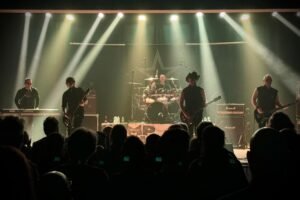The last time we saw Goth rock band Star Industry was at the Liège New Wave Festival in 2020, one of the few events we could enjoy during the pandemic. We loved the powerful concert given by the composers of the classic “Nineties” and we ended the chronicle by saying that we hoped to see them again the following year at Sinner’s Day. But tragedy struck in the form of the death of their bassist Stijn and we could only attend a heartfelt tribute that gived us goosebumps. Now a few years later, they are working on a new album and are back on stage. They will be one of the highlights of the Belgian W-Fest where they are playing on Saturday a the Batcave stage.
 —What made you start Star Industry? You were all from the School of Arts, right? Did you have experience in previous bands?
—What made you start Star Industry? You were all from the School of Arts, right? Did you have experience in previous bands?
—Xavier: Peter, Stijn and I, the three founders of the band, had known each other for years. We sometimes went together to concerts and festivals and shared our love for New Wave and Punk music. We went all 3 to the Academy School of Arts and that’s where we decided to start Star Industry. At that moment Stijn and I had a punk rock band and Peter sometimes joined us on stage as a second guitar player. Peter recorded a few song ideas on a 4-track recorder at home and asked us to listen to them. Stijn and I were immediately being impressed by what we heard. This was fine material and we believed we could make something excellent out of it. So, we decided to start the band. We all had a feeling that there was an excellent cohesion between us as musicians.
—Why did you choose such a curious name as Star Industry?
—Peter: This is a question that everybody wants to know the answer to. That’s okay because from the beginning we wanted to let the name of the band open for everyone’s own interpretation. We like the mystery around that. It’s a strong and energetic name and that stands for our music. It has deeper meant, but that’s up to your own fantasy. One of the thoughts behind the name is a statement against capitalism. The big music industry who are making “Stars” out of nothing only for the profit.
—Some of you are confessed record collectors. How do you think that this influences the music of the band?
—Xavier: Under the veil of you can never have too much vinyl, Peter and I are devoted collectors. Sometimes to the annoyance of the others, cause in every city where we’re playing, we’re always searching for nice record shops, ha-ha. It’s not the collecting itself, but in general we all have a wide taste of music, and for sure that influences the band. And by collecting records you sometimes come across new or unknown bands, which you may consciously or unconsciously be influenced by.
—We could label Star Industry as Goth Rock. How do you see the Goth Rock scene nowadays?
—Kurt: Like any other subculture, it’s not static and reflects various influences. The Goth Rock scene may differ from what it was in the past. But as I see it’s alive and kicking. There are plenty of new bands and every week I get excited about new releases. Also, some established bands are still doing great things. And there are enough nice gigs and festivals to visit. So, long live Goth Rock!
—You have talked about pop influences in your music, the taste for a good melody that can be found in songs like “Eilyne”. A few days ago, I was discussing the value of a good melody with some friends. Do you think it’s easy to compose a catchy song? What are your favourite songwriters in that sense?
—Peter: In my opinion it’s not that simple to write a good song. It all starts with an idea you got in your head. But it’s hard to objective explain what makes a song catchy. A good melody that stuck in the head, a strong rhythm, lyrics with a natural flow, the structure and cadence of the words to fit them around the melody, the search for iconic sounds and interesting chord progressions and so on… It sometimes takes trial and error.
Oh well, I can fill a whole page of favorite songwriters. Personally, I like David Bowie, McCartney-Lennon, Andrew Eldritch, Fad Gadget, Then Comes Silence to name a few.
—It’s curious that you recorded your first album, Iron Dust Crush without playing these songs live. Normally the bands play a lot before recording, why do you think it was different in your case?
—Xavier: Well, we had the experience of playing in several other bands. Sometimes in very small clubs with bad sound systems and poor conditions. Been there, done that, you know.
We were thinking of giving it a different approach cause from the beginning, when we were working on the first Star Industry tracks, we all had that strong feeling we could make something really great out of it. So, we decided to work on the band in the most professional manner possible. With that in our mind, when you don’t have a decent album, how could you introduce yourself on a higher level than before, presenting yourself to better clubs and festivals?
First step was to make an excellent album, recorded in a top studio. We immediately made 1000 copies and released them independently.
 Then we shot some press photos in Paris, just to give the whole thing an international appearance. Next step was promoting ourselves: sending our album to DJ’s, radio stations, journalists, promotors, organizers and so on. Getting the word spread.
Then we shot some press photos in Paris, just to give the whole thing an international appearance. Next step was promoting ourselves: sending our album to DJ’s, radio stations, journalists, promotors, organizers and so on. Getting the word spread.
And this concept paid off! Soon a record company, Purple Moon from Ghent, took over everything, made a second release of the album and took care of distribution and promotion. Some small bookings came in, but we refused them, until a few months later we got the chance to play our very first concert on a festival, together with Love Like Blood and Covenant, in one of the most beautiful and legendary venues of Belgium, the Vooruit in Ghent. Speaking of a good start…
And from that moment, the train was rolling. Our third concert was at the mainstage of the EuroRock festival with Sisters of Mercy and Anne Clark, following by WGT Leipzig.
We know it’s not the normal way, first record an album and then playing the songs live, but I guess it’s our way. With every album, we worked like that. Except for the new one. We have already played a new song live in anticipation of the studio recordings. Just to unveil a little sneak and please our fans while waiting for the new album.
—As you said before, your first concert was during the Black Easter Festival at the Vooruit in Ghent, sharing the line-up with VNV Nation, Covenant and Love Like Blood. How was being on stage for the first time straight in a big event with a lot of public?
—Xavier: As I explained above, we had the idea of making a real good start with this band. So, when we were given the opportunity to play at this festival in one of the most beautiful concert venues in Belgium, the legendary Vooruit, we refused all other offers so that our first concert is forever etched in this venue.
I can tell you that there was a lot of pressure on the band for this first concert and the nerves were stretched to the max. Our album had been on the market for several months and was received excellently everywhere. But there were also many people who wondered whether we would be convincing live on stage. So, we wanted to leave nothing to chance and prepare ourselves optimally to make this first concert a blast. From the beginning we have always found it very important to work with our own sound engineer, who knows how the band should sound live. What’s the point of making an album sound great by recording in a top studio, and then perhaps creating a miserable sound live on stage? So, we first searched for a guy who could do this job and two weeks before the gig we rented a venue in our neighbourhood and a P.A. sound system. There we rehearsed together for a whole day and fine-tuned our sound. In the evening, we invited some friends and played a try-out concert. And as an extra for this concert, we had Christine a live violinist on stage. So, as you see we took it very seriously.
Full of adrenaline, we stepped onto the big stage and played an awesome concert, pushed forward by an amazing warm audience. The responses were overwhelming, and it was a memorable evening that we will never forget.
—In Iron Dust Crush, the band included the first demo. Why didn’t you record these songs again for the album? Were you already happy with the result?
—Peter: In the beginning, soon we recorded 10 demo songs in a little local studio. But in the meantime, we had already finished some new songs that we thought were even better. And in the idea as described above, it would be a good plan to record the best songs in a top studio, so that we could be sure that they would sound excellent.
But a top studio costs top money. We didn’t have a record company. We had to pay everything by ourselves, the studio and the 1000 copies.
So, we all put some savings together, each according to his own ability, some of us were still students. With this money we were able to record 5 songs in this amazing top studio, The Galaxy, known from their productions of Simple Minds, Rammstein, Within Temptation, Kendrick Lamar to name a few. It was Luc Van Acker, at that moment the studio manager, who made us a friendly nice price, for which he was jammed up afterwards by the big boss, ha-ha.
So, we filled the album with 5 demo tracks. We also enjoyed showing the difference between the raw demo versions and the top productions. But just to be clear, it was out of necessity.
Little funny anecdote: When we started recording at Galaxy Studio, we didn’t have a name for the band yet. But to fill out the studio’s official documents, they asked us for a name. So, we quickly fantasized a funny one on the spot. Years later we once needed the recording tapes for a remastering. We called the studio to request the recording tapes of Star Industry. Unfortunately, they couldn’t find anything after a few days searching, which was very strange. Until the moment, a few weeks later, when we realized that everything was still registered under that funny name. The tapes were recovered immediately, ha-ha.
—Why did you think that “Nineties” became so famous? How did your public choose it over the rest of the songs of the album? Do you think that it was because it appeared in some compilations?
—Peter: It’s difficult to explain why one song becomes so popular and another doesn’t. But with “Nineties” we all immediately had a special feeling. The song did something to us, had something magical, stuck in our heads. Was it the catchy hook with a combination of lyrics and melody? Don’t know…? We had already recorded “Nineties” in a small studio, as one of 10 demo songs. Because we felt that this could really be a very good one, we decided to work it out even better and, as the only of the 10 demos, to re-record it in the best conditions at the Galaxy Studio. And that made the song sound the way we intended it. Okay, we may have the feeling that this was a fantastic song, but you never know if people will share our feeling. Luckily, they did, which isn’t always the case.
And yes, “Nineties” appeared on several compilations and so the song quickly spread. Especially the New Alternatives Compilation by U.K. Nightbreed label, very well known in the scene, did a massive job. It was amazing and immediately there was interest in the band from all over the world. And you know, after all those years, we still love to play the song at our concerts with a lot of joy.
 —After the success of the first album, how was recording Velvet?
—After the success of the first album, how was recording Velvet?
—Kurt: After Iron Dust Crush we first continued with The Millennium E.P. what we recorded at a Studio in Tienen (B) where Luc Van Acker again crossed our path as the studio manager. The E.P. contains a cover version of Killing Joke’s “King & Queens” and was official released at the EuroRock festival.
Thereafter, soon we had a lot of new song ideas and started to record the Velvet album. We felt comfortable with the new songs that continued the path of strong guitars and catchy synth melodies pushed forward by Peter’s dark voice. But we made one big mistake! In consultation with our record company, who was going to pay for everything, we opted for a smaller and cheaper studio. The studio itself was okay and the owner and producer was a nice, sweet man who did the best he could but didn’t really have much knowledge or experience with rock music in general. He was more a man of soft pop music. Afterwards we were not satisfied at all with the result. Still with the songs, but not how they sounded. There was a lot of pressure to release the album as quickly as possible, so we didn’t have time to correct the whole thing. And that’s a shame because the music requires a good sound. We always felt that the album could go for more.
And that just kept gnawing at us, so a few years later we had the idea of remixing the whole album. But when we called the studio asking for the original tapes, unfortunately they switched the recording system of the studio to a new one and accidentally lost all the tapes. Sad but true and end of story. But don’t get me wrong, we still love the songs of Velvet.
—Why does it take the band so long to release albums? Are you too perfectionist?
—Peter: There are several reasons for this. After the release of the Renegade album, we were quite busy with rehearsals and playing gigs and it took us a while before we started writing new songs.
We always assume that we want to make an album where every song deserves to be on it. And we’re not easily satisfied. In our opinion a lot of albums contain one or two amazing songs and the rest a bit average. We try to avoid that. We prefer quality over quantity. Perhaps, in such a way, I guess we’re a bit too perfectionist.
And the combination of our jobs and family, some of us have kids, don’t allow us to record an album in one session for example in 14 days. We need to split it in several smaller sessions. That could easily keep us recording sessions for maybe a year. And because we couldn’t get together, the Covid period didn’t really help us either. We were able to work on some ideas individually, but it is still necessary to work things out together.
And then there was the terrible sudden loss of our beloved bass player Stign (Stijn). That hit us extremely hard, and we had to think about how to proceed with Star Industry. After a while we decided to continue with the band. It’s a fantastic group of people to make music with, and we have a great crew to go on the road with, so it would be a shame to give it all up. We also found a solution within the band: Rich exchanges the Keyboards for the Bass guitar, with which he already had a past, and Joël, brother of Xavier, takes on the Synth honours. Stign wouldn’t want it any other way.
As you see, we’re not the most productive guys, but we always go for it.
—How was working with famous producer Luc Van Acker in Last Crusades? Why did you choose him for your third album? As you said before, you met him before during the recording of the first album. Any of his works that you like that made you want to work with him?
choose him for your third album? As you said before, you met him before during the recording of the first album. Any of his works that you like that made you want to work with him?
—Kurt: Luc Van Acker is a big name in de worldwide industrial music scene, and we knew him from his solo work, from his bands Arbeid Adelt! and Revolting Cocks, but also as a live performer with Ministry. And we’re all big fans and loved his work. Because he was studio manager during the recording of Iron Dust Crush and the Millennium EP, we also got to know him personally and he turned out to be a fantastic, warm, and very pleasant guy who breathes music out of every pore of his body.
After the slightly disappointing recording of the Velvet album, we were looking for a better studio for the next recording of the Last Crusades album and our eye fell on Dan Lacksman’s SynSound studio in Brussels. Excellent references and more or less affordable. So, we made an appointment to visit the studio. And when we got there, our surprise was big because without us knowing: guess who was the studio manager? Indeed: Mister Luc Van Acker, ha-ha! Because he really wanted to work with us, he did a proposal that we record the new album in his own studio in Tienen. He had just invested in new recording material and would love to produce us. An offer we couldn’t refuse of course. In a kind of way, you may say Luc choose us instead of we choose him.
It was a long process of almost 2 years. Luc is full of stories and every time we did a new session, first we spent an hour glued to his lips listening to all the fascinating things he had experienced in his rich career. We enjoyed that and of course we worked hard afterwards, and, in the end, we were very satisfied with the result. Luc did an excellent job.
—How is releasing your albums in Alfa Matrix, a mainly electronic music label? Did you get more interested in electronic music or just get more contacts for remixes?
—Rich: You know, we all have a broad taste music: from Jazz to Metal, Punk, Industrial, New Wave, Classic, Electro and so on. We are open-minded in all areas and do not like the box mentality. For us it is not that important in which genre a label is located. Much more important is to have a good feeling about the people behind the label. The people at Alfa Matrix have their hearts in the right place and work hard every day to achieve good results for their artists. It’s not about money, it’s all about the love for music. We are given complete creative freedom and we feel very comfortable with that.
At this moment Alfa Matrix is not only an electronic label anymore. They have started a new division called Spleen+, for their cold wave, post punk and goth rock bands and with next to us a lot of cool bands like The Breath of Life, Lovelorn Dolls, The Names, The Ultimate Dreamers, Hanging Freud, to name a few.
And of course, we still think it’s very cool that we are on the same label as our national heroes Front 242.

Photo: Elke Bredenbruch
—The band has made a few covers, some of them not the obvious choice like MGMT’ “Kids” and Roxette’s “The Look”. What did you find interesting in these songs?
—Xavier: We have always liked to include 1 cover in our set. Every now and then we play at a mainstream festival where people might not know us. And then it’s nice for that audience to hear something recognizable. The Roxette cover was a funny idea from Peter. It was just a challenge to cover a classic top 30 pop song that was not in our comfort zone. It’s done with a big wink and nothing more than that. The MGMT cover was something else. For years I have also been a DJ who likes to play at alternative parties. And every time I played “Kids”, I got the feeling that this song could be something for us. It has that certain vibe that we liked, such as those electronic elements, the dark deep wave synthesizer as you find in the early new wave bands or Vive La Fete and so on. It has a lot of energy and pushes you forward. And with a Star Industry sauce on top, it seemed perfect for our live sets. We gave the song a chance for rehearsal, and it turned out to work straight away. We like the challenge of sometimes not making an obvious choice and colour outside the lines a bit. We’ve played the song in our set for many years and still love it. You could really say that we made the song completely our own. There are even people who think MGMT covered it from us, ha-ha. And who knows what song we will tackle again in the future.
—Also, you have collaborated in a couple of Alfa Matrix’s tribute albums and so, recorded songs of Front 242, The Cure and Depeche Mode. I guess all of you are followers of these three classic bands. Any other song or band taht you will like to tackle in the futre?
—Rich: Yes, that’s right. We’re all big fans of these bands. Whenever we are asked by Alfa Matrix to participate in such a tribute album, we always do so with great pleasure. These are nice compilations with sometimes surprising covers. And it’s also great for our fans to alleviate the long wait between albums a bit, I guess.
We don’t actually have a list of bands we would like to cover. It’s always someone’s spontaneous idea, and if we all agree, we give it a chance for rehearsal. Sometimes it works, sometimes it doesn’t. As simple as that.
—Being from Madrid I would like to ask you why you wanted to record your live album in this city?
—Kurt: At that time, we had the plan to release a live album. People often told us after seeing us live for the first time that they were completely blown away. That they loved our albums, but that our concerts sounded a lot fuller and more energetic. And that is indeed true. We are a real live band. It’s a lot rougher and rocks a lot more. And that is completely the intention. So, even though it’s not really possible of course, let’s try to catch that a little bit on an album. And of course, we wanted to do that in a city with a big name, a world city. We had already played in many beautiful cities, some even several times. And when we got the opportunity to play in Madrid, the promoter himself made us an offer to make live recordings. They had experience with that and could easily hire the necessary recording equipment. Of course, we had no doubts about that for a second. We were very charmed that we could capture this for eternity in your lovely, wonderful city.

Photo: Elke Bredenbruch
—And The Renegade is, so far, your last album, where you added more influences on the mix. When you are composing a new album, do you focus on doing something different from the previous or is it something that happens naturally?
—Peter: No, we’re not focus on doing something different. The process of writing a new album is always a natural thing. We all have a wide eclectic taste in music and are certainly strongly influenced by that. So, I think you can hear these influences in our music sometimes. When someone comes up with a new idea, we check with the group whether we all agree with it and of course we make sure that it fits within the Star Industry sound. But for the rest we don’t limit ourselves too much. And we don’t like box-thinking. We just like to have a lot of variety. This is how we try to keep the album interesting. It might be much easier to make an album with 10 more or less the same songs, but that seems boring to us. It’s much nicer to experiment sometimes a bit with new sounds and influences.
You know, we once had the opportunity to sign with a big major label/management. But they immediately wanted to determine our music and limit our creativity. Even our stage outfit would be chosen by them. We kindly thanked for that. We don’t want to sell our souls.
—We were at the edition of the Sinner’s Day that you have to cancel because your bass player Stijn died a few days before. Instead, a DJ played your songs, I guess it was a very emotional moment for you. We lived it as a public, but how was it for you? How do you remember the contribution of Stijn to the band?
—Xavier: We were not present at the venue at that time. That was too hard, too emotional for us. We did bring Stijn’s bass guitar because the DJ’s wanted to put it on stage as a tribute, which was of course a nice gesture. Afterwards we were sent many videos of this beautiful honourable moment that the DJ’s and the organization had created. That brought comfort and was gratifying.
The loss of Stijn is enormous. He leaves an incredible void within the Star Industry family. Within the band we always try to make the best use of everyone’s talents, and he had many. Stijn had no children and that gave him the opportunity to spend a lot of time working on the band. He was very good at maintaining contacts, in communication, for booking performances, and had an excellent artistic vision on everything. He was also the man who always pushed us to try to do things in a big way. Recording in The Galaxy Studio, taking press photos in Paris, touring in China and the USA, to name a few, it’s all his thing. He always had good creative ideas, also when writing songs. He could also bang his fist on the table when things were in danger of going sour. And sometimes that is necessary. But above all he was someone who laughed a lot and brought a lot of fun to the band. And after all, that is perhaps the most important thing. Enjoy yourself a little in life. And we have always done that with Star Industry, and still do. We miss him immense. We have so many good memories of him. Every week, old stories are brought up and we can’t stop laughing, and so he continues to live on among us. We hope that somewhere he is watching over us and that we can still make him proud.
—What are your plans for the future? You said that you were going to release a new album this year.
—Peter: Yes, that is certainly the intention and that is where our full focus is now. We already have a lot of ideas, and we are now working them out in detail so that we can soon start a first session of studio recordings. We even limit ourselves in taking on gigs so that we can remain fully concentrated on working on the new album. And we hope that we will manage to get it on the market this year. We do our best.
—What can we expect of your future concert at W-Fest?
—Joël: Since I joined the band last, I may also answer this last question. What can you expect from our performance at W-fest?
Well, the idea is that at a certain point in the set we will fire our drummer Kurt as a living canon bullet from a canon from behind his drum into the rafters of the tent. We will also bring some Australian frilled lizards who will run across the stage in a beautiful choreography. And we are busy collecting some nuns from a monastery who will serve as a background choir and will accompany “Nineties” on the pan flute. I wonder if we will all succeed. I hope to see you then!



